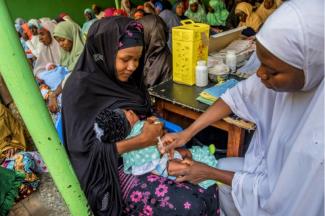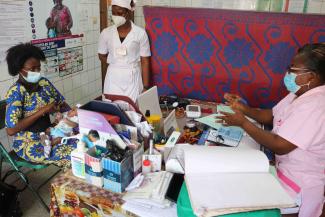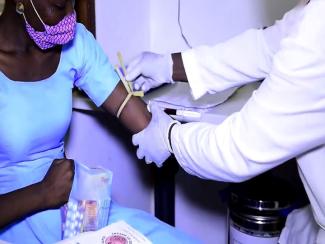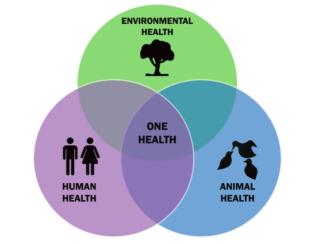Health is an essential foundation for long-term development of economies and societies. With a rapidly growing population of 401.1 million, a healthy, productive workforce requires sound investments in human capital. The USAID/West Africa Regional Mission has identified health as one of its top priorities, and through its Regional Health Office (RHO), the Mission is focused on partnering with West Africans in strengthening health services and systems throughout West Africa. Presently, RHO implements family planning service delivery programs in four focus countries; Burkina Faso, Côte d'Ivoire, Niger and Togo. Additionally, RHO supports the U.S. President's Emergency Plan for AIDS Relief (PEPFAR) programming in Burkina Faso and Togo, and will expand to Benin in October 2021. Through programming and collaboration with the West Africa Health Organization (WAHO), the institution entrusted by the Heads of State and Government to ensure the coordination of regional health interventions within the ECOWAS region, and with other donors and partners, the RHO reaches other West African countries through an advocacy and policy role. USAID’s support to WAHO benefits all 15 ECOWAS member states.
By working with key institutions in the region, RHO is ensuring timely access to quality essential health products and services, improving in-country and regional collaboration and coordination, and supporting the global health security agenda (GHSA). Funded activities support the scale up of best practices for distribution, warehousing, logistics, data visibility, and contraceptive stock monitoring. This support enables the four focus countries the ability to manage their health commodities more effectively. RHO is also working toward achieving common, shared goals in family planning and reproductive health, including maternal and child health, HIV/AIDS prevention, care and treatment, and nutrition. USAID’s engagement with regional organizations helps to operationalize family planning commodity security initiatives and build the knowledge repository for public health professionals to learn from one another.
Together with WAHO, RHO is strengthening national health systems by using relatively small, catalytic investments. An intensive focus on systems and institutional capacity-building, along with the continued prioritization of High Impact Practices (HIPs) and related policies, better equip countries to reduce morbidity and mortality, combat infectious diseases, and advance equity in healthcare. In addition, USAID also partners with WAHO to strengthen its capacity and enable the organization to fully execute its mandate through the Leadership Capacity Strengthening Project (CAPS). In ECOWAS member states, WAHO is also promoting public-private partnerships with health care providers and institutions to create platforms for strategic dialogue. By engaging the private sector in health care provisions, investments in health care are increasing, as well as the availability and quality of health services.
RHO also builds the capacity of host country governments and National Statistics Offices to collect, monitor and evaluate data on their family planning, fertility, maternal and child health, nutrition, HIV/AIDS, and malaria for policy and decision making through the Demographic and Health Survey (DHS) activity. Cameroon, The Gambia, Mauritania and Togo are some of the recent beneficiaries.
Family Planning and Reproductive Health, and Maternal and Child Health
The Regional Health Office in the USAID/West Africa Regional Mission promotes expanded access to, and utilization of quality family planning (FP) services. USAID's program, Amplify Family Planning and Reproductive Health (AMPLIFY PF) works with local partners on the ground who are mobilizing and supporting community health workers, midwives, primary-level clinic nurses, and other clinicians to provide FP counseling and offer a full range of contraceptives, including long-acting contraceptive methods. Amplify PF collaborates with other USAID programs such as the Health Policy (HP+), Global Health Supply Chain (GHSC-PSM) and Global Health Supply Chain Technical Assistance (GHSC-TA Francophone TO) and West Africa Breakthrough Action (WABA) to achieve its wide reaching goals. Other health services that are supported include: antenatal, labor and delivery, postpartum care and FP; well child visits; nutrition and HIV/AIDS prevention; treatment and care that is tailored to meet the needs of and facilitate access for youth.
RHO also supports commodity security through a regional contraceptive early warning system managed by WAHO for the ECOWAS member countries to: coordinate contraceptive stock data and address stock imbalances; improve data visibility; and inform robust reproductive health commodity supply chain management and decision-making.
With the Ouagadougou Partnership RHO is mobilizing domestic resources and supports implementation plans for FP aimed at doubling the number of modern contraceptive users from 6.5 million to 13 million by 2030 in line with FP 2030 goals. The Partnership includes the governments of nine francophone West African countries supported by USAID, the French Ministry of Foreign Affairs, the Agence Française de Développement, the Gates and Hewlett Foundations, the United Nations Fund for Population Assistance (UNFPA), WAHO and others. Due to the successful collaboration with the Ouagadougou Partnership and the commitment to increase utilization of quality health services, member states have exceeded the target for 2.2 million new contraceptive users by about 263,000 users, despite a COVID-19 related slowdown in service delivery.
HIV/AIDS Prevention, Care and Treatment
The U.S. President's Emergency Plan for AIDS Relief (PEPFAR) is the largest commitment by any nation to address a single disease in history. As part of PEPFAR’s West Africa regional platform, which includes Benin, Burkina Faso, Ghana, Liberia, Mali, Senegal, Sierra Leone, and Togo, the Regional Health Office in the USAID/West Africa Regional Mission supports HIV programming mainly with governments and civil society organizations in Burkina Faso, Togo, and Benin. RHO's goal with PEPFAR funding is to accelerate progress in these three countries toward achieving the UNAIDS 95-95-95 goals by 2025 (95% of people living with HIV know their HIV status, 95% of those who know their status are on lifesaving antiretroviral therapy and 95% of those who are on antiretroviral therapy are virally suppressed) and eliminate HIV/AIDS by 2030.
USAID’s program, #Ending AIDS in West Africa supports health workers at facilities and at the community level to provide comprehensive and effective HIV prevention, care and treatment services to key and general populations in high burden HIV areas, including interventions against gender-based violence, stigma, and discrimination.
In collaboration with government Health Ministries, civil society organizations and the Global Fund to fight AIDS, Tuberculosis, and Malaria, RHO is helping to reduce service inequalities among female sex workers, men who have sex with men, children, adolescents, youth, adult women, and adult men. #EAWA relies on the rapid scale-up of effective and innovative practices, and supports index testing, enhanced peer outreach, self-testing, pre-exposure prophylaxis, transition to the fixed-dose combination tenofovir/lamivudine/dolutegravir (TLD), and differentiated service delivery with multi-month antiretroviral dispensing.
In 2020, with RHO’s support, despite the COVID 19 pandemic, PEPFAR-supported health facilities in Togo and Burkina Faso doubled their HIV case finding performance compared to 2019 and maintained a high rate of continuity of treatment among the 58,789 people living with HIV who were on life-saving antiretroviral therapy.
Community-led Monitoring Activities at PEPFAR-supported Sites in Togo and Burkina Faso
Community-led monitoring is an approach that combines systematic and routine data collection by the communities themselves (civil society organizations) with evidence-based advocacy to improve access to, and quality of services, accountability, and governance. It thus contributes to early identification of shortfalls and barriers to access to services, bringing corrective actions to them, adapting the quality of services to the points of view of beneficiaries and strengthening community engagement. The Regional Health Office awarded two separate Fixed Amount Awards (FAA) to two local civil society organizations in Togo and Burkina Faso to conduct community-led monitoring of HIV service delivery activities in those countries.
Nutrition
The Regional Health Office works toward strengthening food security and achieving improved nutrition practices and outcomes for mothers and children in select cities and towns in Niger, such as Zinder. Through an integrated package of services that is provided in a single consultation, more families are receiving family planning, maternal child health and nutrition services, from antenatal care to labor and delivery, to the postpartum period.
Together with the Regional Economic Growth Office and WAHO, RHO supports activities that also aim to increase access to safe and nutritious foods through strengthened food safety systems, like improved nutrition monitoring and surveillance systems, coordinate with and scale-up regional food fortification and biofortification policies and technologies.
In FY2021, the parents/caretakers of approximately 11,056 children in Niger received social and behavior change consultations that promoted infant and young child feeding practices. USAID and WAHO also jointly established a Regional Food Fortification Alliance and Regional Health Observatory that monitors progress on nutrition in the region.
Global Health Security
USAID engages in global health security through a One Health framework, a multi-sectoral approach that recognizes the interconnection between people, animals (wild and livestock), plants, and our shared environment. An integrated One Health approach to public, animal, and environmental health is vital to preventing, detecting, and responding to pandemics.
RHO collaborates with WAHO through the Regional Centre for Surveillance and Disease Control in Nigeria and the Regional Animal Health Center in Mali, to advance the global health security agenda and One Health.
COVID-19 Response
COVID-19 has become one of the most widespread public health emergencies in history. USAID’s support to control the spread of COVID-19 in West Africa takes place at both the regional and national level. Through WAHO, USAID is helping to prevent the spread of COVID-19 by supporting the regional coordination of training, risk communication, rapid response, and cross-border collaboration. RHO is also providing assistance to multiple national COVID-19 responses in the areas of infection prevention control, water, sanitation and hygiene, risk communication and community engagement, monitoring and evaluation, and vaccine deployment.
Learn More:

Photo Credit: Karen Kasmauski/MCSP

Photo credit: Abdoul Alitchawu and Israel Gbadoe

Photo credit: #EAWA

Photo Credit: USAID/Senegal

Photo Credit: Thddbfk, CC BY-SA 4.0 <https://creativecommons.org/licenses/by-sa/4.0>, via Wikimedia Commons
